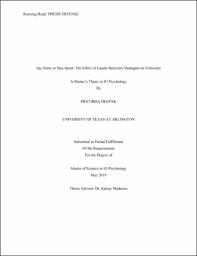
ATTENTION: The works hosted here are being migrated to a new repository that will consolidate resources, improve discoverability, and better show UTA's research impact on the global community. We will update authors as the migration progresses. Please see MavMatrix for more information.
Show simple item record
| dc.contributor.advisor | Medeiros, Kelsey | |
| dc.creator | Deepak, Pratibha | |
| dc.date.accessioned | 2021-06-03T19:58:58Z | |
| dc.date.available | 2021-06-03T19:58:58Z | |
| dc.date.created | 2019-05 | |
| dc.date.issued | 2019-05-21 | |
| dc.date.submitted | May 2019 | |
| dc.identifier.uri | http://hdl.handle.net/10106/29885 | |
| dc.description.abstract | Recently, there has been a rise in reports of ethical transgressions in the workplace. Examples
such as Enron and Wells Fargo highlight this trend. The current literature on workplace
transgressions such as these has primarily focused on why the transgression occurred. Although
this work is informative as to why leaders may transgress, it speaks little to how leaders may
recover from such transgressions. Indeed, there remains little research focused on the recovery
mechanisms leaders may employ after a transgression and the effect of such recovery
mechanisms on follower attitudes and behavior. To address this gap, an experimental approach
will be used to test the mediating role of trust in the relationship between leader recovery
approach and follower ethical behavior and affective commitment. Additionally, it is proposed
that leader type (ethical versus neutral leader) will moderate the relationship between error
recovery tactics and the trust in leadership such that a stronger relationship in trust recovery will
be observed for ethical leadership compared to neutral leadership. Results from the path analysis
indicate that followers who view their leaders as trustworthy will have more affective
commitment to their organization. However, trust did not influence the ethical outcomes
assessed. An effect of error recovery strategy on cognitive trust was found. Implications for
theory and future research along with practical implications for the applied field on leader error recovery are suggested. | |
| dc.format.mimetype | application/pdf | |
| dc.language.iso | en_US | |
| dc.subject | Ethical transgression | |
| dc.subject | Apology | |
| dc.subject | Reticence | |
| dc.subject | Social learning theory | |
| dc.subject | Trust in leader | |
| dc.subject | Affective commitment | |
| dc.subject | Ethical behavior | |
| dc.title | Say Sorry or Stay Quiet: The Effect of Leader Recovery Strategies on Followers | |
| dc.type | Thesis | |
| dc.degree.department | Psychology | |
| dc.degree.name | Master of Science in Psychology | |
| dc.date.updated | 2021-06-03T19:58:58Z | |
| thesis.degree.department | Psychology | |
| thesis.degree.grantor | The University of Texas at Arlington | |
| thesis.degree.level | Masters | |
| thesis.degree.name | Master of Science in Psychology | |
| dc.type.material | text | |
Files in this item
- Name:
- DEEPAK-THESIS-2019.pdf
- Size:
- 548.6Kb
- Format:
- PDF
This item appears in the following Collection(s)
Show simple item record


